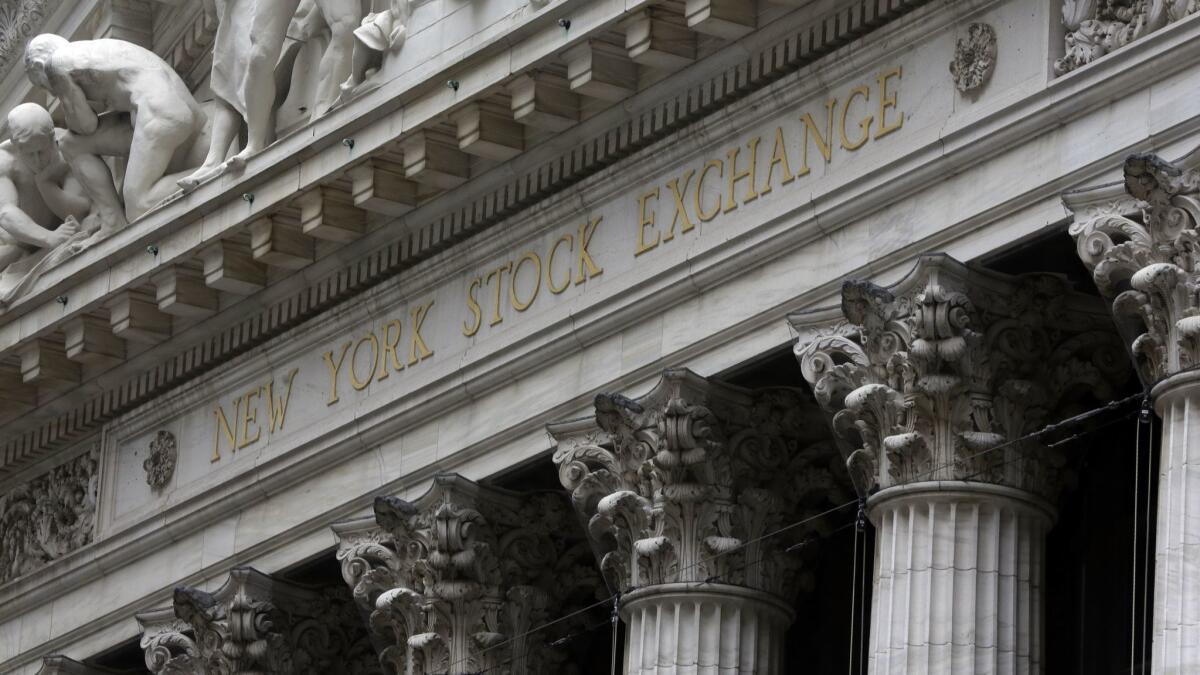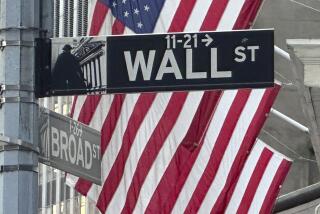Stocks slip on Wall Street over coronavirus stimulus delays

- Share via
U.S. stocks capped another wobbly day of trading with modest losses Wednesday as Wall Street waited for any sign of progress as lawmakers in Washington negotiate over how to deliver more aid for the economy.
The Standard & Poor’s 500 index slipped 0.2% after shifting between small gains and losses for much of the day. The benchmark index is on track for its first weekly loss after notching gains in each of the last three weeks. Losses in industrial stocks, healthcare companies and elsewhere in the market outweighed solid gains by communication services stocks. Treasury yields were mixed.
Much of Wall Street’s focus has been on Washington, where White House officials and Democrats are negotiating on another round of support to prop up the still-struggling economy, though the prospects for a deal that delivers aid soon remain cloudy.
The S&P 500 fell 7.56 points to 3,435.56. The Dow Jones industrial average lost 97.97 points, or 0.4%, to 28,210.82. The index had briefly been up 141 points. The Nasdaq composite gave up 31.80 points, or 0.3%, to 11,484.69.
Stocks of social media companies were among the biggest gainers after Snap reported even bigger jumps in revenue and in the number of people using its Snapchat service each day than analysts expected.
Snap surged 28.3% following its quarterly earnings report. In its wake, Twitter jumped 8.4%, the biggest gainer in the S&P 500, and Facebook rose 4.2%.
Google’s parent company, Alphabet, rose 2.3%, adding to its gains from a day before when the Justice Department sued it over alleged antitrust violations. Investors had already been expecting such action, and analysts said Google’s counterarguments mean it probably will take years to reach a resolution.
On the losing end was Netflix, which fell 6.9% for one of the largest losses in the S&P 500 after it said growth in its subscriber rolls slumped by more during the summer than it had forecast. It also reported a weaker quarterly profit than analysts expected, following a surge earlier this year when people were yearning for things to watch amid coronavirus-caused lockdowns.
It’s a rare disappointing report in what has been a much better earnings season than Wall Street had feared. Roughly 1 in 6 of the companies in the S&P 500 index has reported its results for the July-through-September quarter, and most have topped the low expectations analysts had set.
S&P 500 companies are on track to report a decline of a little less than 18% in earnings per share for the quarter from a year earlier, which is not as bad as the 21% drop that analysts were forecasting at the end of the quarter, according to FactSet.
Traders have been keeping one eye on corporate earnings, and another on the prospects for more economic stimulus out of Washington.
The two sides have been making progress, House Speaker Nancy Pelosi told her Democratic colleagues in a letter late Tuesday. She said she hopes discussions will continue past a self-imposed deadline of Tuesday.
Markets have been swinging recently with the perceived prospects of such stimulus. Investors have been clamoring for it since the summer, when extra benefits for laid-off workers and other support provided by the last round of aid approved by Congress expired.
But even if leaders from the White House and House of Representatives can reach a compromise soon, its fate looks unclear on Capitol Hill because of its growing price tag. Senate Majority Leader Mitch McConnell told fellow Republicans that he has warned the White House not to divide the party by sealing a relief deal before the election that could cost $2 trillion.
The yield on the 10-year Treasury rose to 0.82% from 0.81% late Tuesday. It has been generally climbing since dropping close to 0.60% early last month.
European markets closed broadly lower, while Asian markets closed higher.
More to Read
Inside the business of entertainment
The Wide Shot brings you news, analysis and insights on everything from streaming wars to production — and what it all means for the future.
You may occasionally receive promotional content from the Los Angeles Times.










